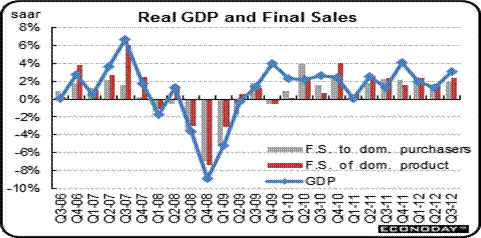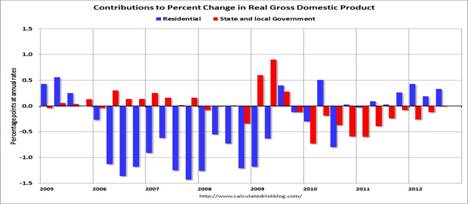
Any doubts how dependent the rest of the world is on U.S. growth was dispelled on ratification of the 'fiscal cliff' bill by Congress. The world's stock markets rallied on the news. The DOW was up 2.35 percent, Europe's FTSE 2.19, Hong Kong's Hang Seng 2.98 percent, for starters.
With the 'fiscal cliff' no longer a cliff (thanks to Congress finally listening to voters), 2013 might be the year of full recovery from the Great Recession. Real (after inflation) U.S. Gross Domestic Product is up 2.5 percent from its pre-recession highs, with only China's growth rate higher since the Great Recession. This is in spite of various catastrophic events -- such as Hurricane Sandy and the debt ceiling debate yet to come.
Graph: Econoday
Details are still vague on all details of the final fiscal cliff negotiations, but we know it preserves the tax rates prevailing at the end of 2012, except for those individuals earning more than $400,000 and households earning over $450,000. It also allows taxes on capital gains and dividends to go up, and extends benefits of the unemployed. Additionally, the Senate bill delays the onset of the "sequester" -- the swift, automatic spending cuts -- for two months.
The increased tax revenues will boost growth in 2013. Why? Northern Trust's retired Chief Economist Paul Kasriel said in Barron's magazine what many economists are saying -- that the additional revenues will boost private sector growth: "The Treasury is going to collect higher taxes from me and either transfer them to you or buy something from you. In other words, an increase in tax revenues will not 'suck' spending power out of the economy, but rather redistribute that spending power."
This is just what is needed to stimulate higher growth. The additional revenues flow to U.S. consumers who will spend it domestically, thus creating more jobs. U.S. national and local governments spend directly to benefit constituents, in other words, whether in education, infrastructure, the social safety net, or research and development.
The fiscal cliff deal also extends the child tax credit and the college tuition credit for five years, individual and business tax extenders for two years, and the Medicare "doctor fix" for one year. The Alternative Minimum Tax will be permanently fixed. The agreement also extends the farm bill for one year.
Graph: Calculated Risk
So the additional tax revenues mean 2013 should be the year that government no longer acts as a drag on growth. State and local governments have been a drag on GDP for twelve consecutive quarters. Although not as large a negative as the worst of the housing bust, this decline has been relentless and unprecedented. The good news is the drag appears to be ending.


